 Out of the Drowning Deep by A.C. Wise
Out of the Drowning Deep by A.C. Wise Format: ebook
Source: supplied by publisher via NetGalley
Formats available: hardcover, ebook
Genres: fantasy mystery, horror, mystery, science fiction mystery
Pages: 176
Published by Titan Books on September 3, 2024
Purchasing Info: Author's Website, Publisher's Website, Amazon, Barnes & Noble, Kobo, Bookshop.org, Better World Books
Goodreads
In the distant future, when mortals mingle with the gods in deep space, an out-of-date automaton, a recovering addict, and an angel race to solve the Pope’s murder in an abandoned corner of the galaxy.
Scribe IV is an obsolete automaton, peacefully whiling away his years on the Bastion, a secluded monastery in an abandoned corner of the galaxy. But when the visiting Pope is found murdered, Scribe IV knows he has very little time before the terrifying Sisters of the Drowned Deep rise up to punish the Bastion’s residents for their crime.
Quin, a recovering drug addict turned private investigator, picks up a scrambled signal from the Bastion and agrees to take the case. Traumatized by a bizarre experience in his childhood, Quin repeatedly feeds his memories to his lover, the angel Murmuration. But fragmented glimpses of an otherworldly horror he calls the crawling dark continue to haunt his dreams.
Meanwhile in Heaven, an angel named Angel hears Scribe IV’s prayer. Intrigued by the idea of solving a crime with mortals, xe descends to offer xer divine assistance (whether those mortals want it or not). With the Drowned Sisters closing in around the Bastion, Scribe IV, Quin, and Angel race to find out who really murdered the Pope, and why. Quin’s missing memories may hold the key to the case—but is remembering worth the price?
Haunting, dreamy and beautifully written, Out of the Drowning Deep is perfect for fans of Becky Chambers, Martha Wells, and This Is How You Lose the Time War.
My Review:
I’m not quite sure what I was expecting with this one – but I’m certainly that I wasn’t expecting the ginormous size of the book blender that would be needed to encompass the many, many, many bookish influences that I caught glimpses of along its merely – I say again – MERELY 176 pages of mysterious, fantastical, science fictional surprises, delights and horrors.
Definitely the horrors. This is one of those cases where judging the book at least a bit by its cover is utterly justified. Because Out of the Drowning Deep absolutely does go to some truly creepy places – and that cover doesn’t just merely reflect that fact but stares it down with myriad, haunting and haunted, eyes.
We start with a mystery. In this far-future universe, in an ancient monastery long decayed from its glory days, the visiting Pope has just been murdered.
Scribe IV, the AI-driven “automaton” in charge of “The Bastion” is already regretting his wish for a bit of mystery in his routine existence. The mystery that has just fallen at his feet has the potential to bring about the end of the home and sanctuary of every member of the Bastion’s remaining staff, including himself.
It might also mean the literal end of all of them AND as well as the place itself, as it seems that Scribe IV’s acknowledgement of the identity of the body has triggered an immediate response from the dreaded Drowned Sisters.
As if their name wasn’t ominous enough, the Sisters have the power to lock down the Bastion, take over the investigation of the Pope’s death, and act as judge, jury and executioner on the whole tragic and/or terrible mess.
The Sisters are not known for their mercy. They are however known for their headlong rush to punitive judgment and the swiftness of their actions tells Scribe that they have passed that judgment long before the murder took place – to the point where they might have been instrumental in it or were merely waiting in the depths to pounce on any conceivable opening to swoop down upon the Bastion and Drown the old temple with its population still inside.
Scribe has one hope – and yes, the automaton has taken on the possibility of hope, and even prayer, along with a host of other human characteristics over the years of his service transcribing prayers and serving as majordomo of the Bastion.
He managed to get an SOS out before the Sisters locked the Bastion down. Scribe called for any independent investigator to answer his call. And he was answered by not one but two investigators; a man with his own terrible experiences of gods, monsters and the creatures who exist between the two, and an angel who the Sisters may not believe in but whom they also cannot control.
Even if this whole sordid mess is part of their attempt to control someone even more powerful – the god they claim to serve.
Escape Rating A-: About that gigantic book blender I mentioned earlier… This was a book that persisted in making me think of other books although I still got completely wrapped up in the story that it was telling. Then again, I really do love the current run of SF and Fantasy mysteries and this is absolutely part of that wave – pardon the pun.
So the overarching vehicle for this is solving that mystery, the who and how and why of the dead Pope lying on the Bastion’s floor. (Whether the Pope in this far-flung future is a direct spiritual or organizational descendant of the current Pope isn’t detailed and doesn’t need to be.)
Which led directly to one of the books this one reminded me of, albeit in opposition, and that was Lavie Tidhar’s short story “The Old Dispensation” in the recent New Adventures in Space Opera collection. Because that story, which also dealt with terrible acts of a far-future religious organization, used entirely Jewish references for its religious iconography and the unadorned, unexplained use of ‘The Pope’ as a person of religious authority was a reminder that Christian-styled reference in both SF and Fantasy can pass without definition or explanation.
Scribe’s desire to investigate the mystery and find the truth instead of swallowing the uncomfortable lie that he knows the Sisters are about to proclaim struck sparks of the independent investigative journalist AI Scorn from Aimee Ogden’s Emergent Properties.
The truth of this universe relies on a bit of the premise that underscores American Gods, that man makes actual gods in his own image and can literally make himself into one under the right conditions. This particular chain of thought also looped in a bit of Max Gladstone’s Three Parts Dead.
 But the two books that I felt most keenly related to Out of the Drowning Deep were, on the one hand, We Shall Sing a Song Into the Deep by Andrew Kelly Stewart and The Angel of the Crows by Katherine Addison.
But the two books that I felt most keenly related to Out of the Drowning Deep were, on the one hand, We Shall Sing a Song Into the Deep by Andrew Kelly Stewart and The Angel of the Crows by Katherine Addison.
Those are two books that probably shouldn’t have anything to do with one another – and yet they are blended together in Out of the Drowning Deep.
Like We Shall Sing a Song Into the Deep, Out of the Drowning Deep (and yes, the similarity of the titles does echo more than a bit) there’s that shifting foundation of the way that the isolated religious worshippers – the Sisters here and the Brothers there and I just picked up that bit of irony – have wrenched their original worship of their deity and their service to its commandments into an even darker message that they intend to inflict on their world at any cost and by any means necessary. Once they served their gods faithfully – now they intend their gods to serve them.
As dark as that part of the story is, and as often as Angels appear in fantasy and even SF as overbearing, overzealous, self-righteous destroyers, in Out of the Drowning Deep, while that’s the reputation the Angels certainly have, that’s not all that they are, and that’s absolutely not who the two Angels who become involved in this mystery, Murmuration and especially the investigating angel who befriends Scribe, the one who calls xemself just Angel, both feel more human and take on more human characteristics, both good and bad, than Scribe initially expects, much like in The Angel of the Crows.
Which leads the automaton Scribe IV, who has taken on more human attributes than he likes to admit to, to consider the possibility of a much different future, a future of his own choosing, than he ever imagined possible. With a friend he never expected at all.
There’s more here. In fact, there’s lots more here. For a novella, Out of the Drowning Deep went to a lot of fascinating and surprising places, and I was as delighted to go there with Scribe IV as I was creeped out by all those eyes.

 Navigational Entanglements by
Navigational Entanglements by  Escape Rating A-: I grabbed this book because I’ve been picking my way through the author’s vast, sprawling,
Escape Rating A-: I grabbed this book because I’ve been picking my way through the author’s vast, sprawling,  The Citadel of Weeping Pearls (Xuya Universe) by
The Citadel of Weeping Pearls (Xuya Universe) by  I’ve been nibbling at the vast, sprawling
I’ve been nibbling at the vast, sprawling  But nothing is quite as it seems, as the possibility of going back and bringing the Citadel forward forces everyone who has been touched by its disappearance to rethink what they did then, what they’ve felt in the absence of the shooting star that is/was Bright Princess Ngoc Minh, and what they might do with a second chance.
But nothing is quite as it seems, as the possibility of going back and bringing the Citadel forward forces everyone who has been touched by its disappearance to rethink what they did then, what they’ve felt in the absence of the shooting star that is/was Bright Princess Ngoc Minh, and what they might do with a second chance.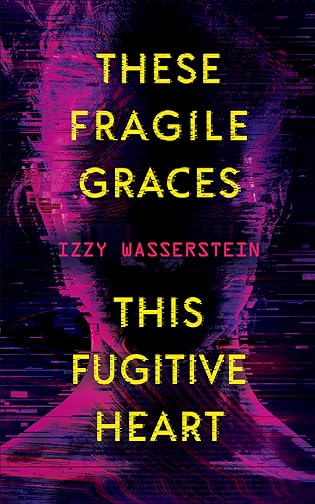 These Fragile Graces, This Fugitive Heart by
These Fragile Graces, This Fugitive Heart by 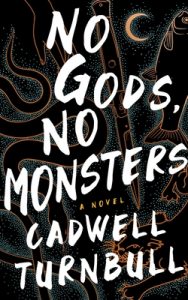 I also would have loved a bit more about the anarchist and commune movement as it applied to this particular story, because I was basing all of my knowledge and acceptance of the way that part of their world worked on Cadwell Turnbull’s fantastic
I also would have loved a bit more about the anarchist and commune movement as it applied to this particular story, because I was basing all of my knowledge and acceptance of the way that part of their world worked on Cadwell Turnbull’s fantastic 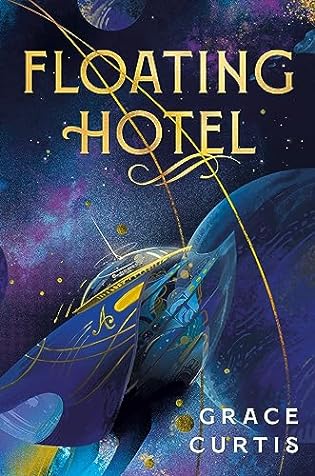 Floating Hotel by
Floating Hotel by  The Imposition of Unnecessary Obstacles (Mossa & Pleiti, #2) by
The Imposition of Unnecessary Obstacles (Mossa & Pleiti, #2) by 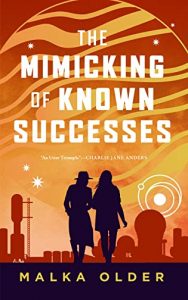 Escape Rating A+: There’s something supremely comforting about this series – and I’m oh-so-happy it IS a series because
Escape Rating A+: There’s something supremely comforting about this series – and I’m oh-so-happy it IS a series because  Seven of Infinities by
Seven of Infinities by 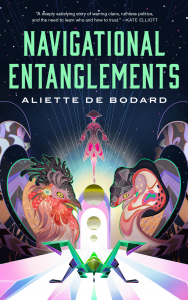 In the
In the 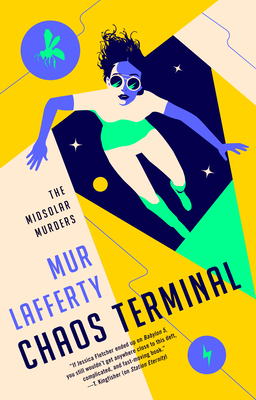 Chaos Terminal (The Midsolar Murders, #2) by
Chaos Terminal (The Midsolar Murders, #2) by  Escape Rating B: One of the things that made the first book in this series,
Escape Rating B: One of the things that made the first book in this series, 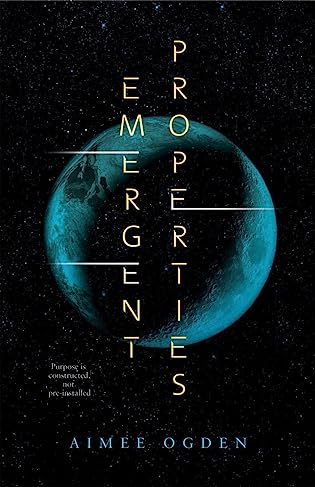 Emergent Properties by
Emergent Properties by